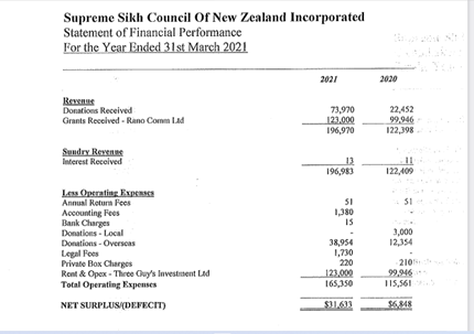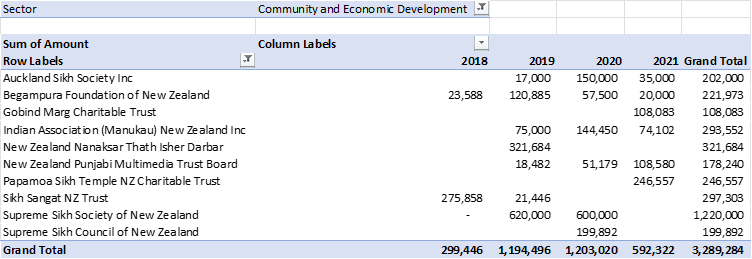Anyhoo… in that work I found there was a new entrant in town who looked intriguing. After I sent an email or two to DIA to find out why their grant weren’t disclosed, magically now grants are disclosed (thanks me).
They have been in operation since 2018. They clearly did get the diversity memo, with three women and one man making decisions.
Their Authorised Purpose is very broad (below copied from their website). What’s interesting is the heavy religious overtones in the charitable purposes: something I admit to never having seen before in a gaming trust.
Rano Community Trust Limited may make grants for any charitable purpose and any noncommercial purpose that is beneficial to the whole or a section of the community. Priority funding will be given to amateur sport, religion, education and not-for-profit organisations which actively support community education and cohesion.
The above authorised purpose includes (but is not limited to) providing grants for:
- The promotion of health via participation in amateur sport in particular cultural games that include an element of education;
- Provision of amateur teams playing and training uniforms to be retained by the club or team;
- Amateur teams training costs;
- Amateur players reasonable and necessary travel expenses including accommodation and insurance costs associated with the travel;
- Wages and salaries where the employing body has an entirely non-commercial or charitable purpose and provided that the payment is necessary to achieve the organisation’s purpose, that is, where the non-commercial or charitable purpose would not be achieved without it (the wider benefit to the community must outweigh any private benefit);
- Vehicles for any organisation which are related to any an entirely non-commercial community or charitable purpose (excludes club courtesy vans);
- Classes that teach swimming for adults to protect human life;
- Supporting primary and secondary schools, training and education;
- The provision of non-profit childcare and educational services for young children;
- Scholarships and prizes for academic achievement (provided the students are selected in a fair and open manner, and are overseen by a recognised educational authority or school board);
- The promotion, planning, organising and running of non-profit events that celebrate or concern different cultures such as community cultural and arts festivals including cultural music festivals;
- Providing or maintaining grounds and buildings to be used by churches, temples or other religious organisations;
- Public works and services e.g., public car parks, footpaths, cycleways and roads;
- The promotion of public amenities such as parks or museums;
- Supplying of religious literature;
- Providing religious education through religious schools, theological colleges and conducting religious retreats; and
- Provision for other not-for-profit organisations which promote community cultural education and cohesion.
So what’s interesting then is how that Authorised Purpose is applied. I’ve taken all the grants given since inception that have been published (to July 2021), categorised using my very special algorithm, and hey presto.
Now, I think you will find this super interesting. The top ten Community Organisations who received funding from Rano are:

Sport is pretty popular too (of course you say). However, I think you’ll be surprised. The most popular sport was fringe! This is because I have never heard of Kabaddi. It’s a team sport very popular in India. Next most popular was Touch: again a surprise, followed by a usual suspect of Football, then Volleyball. Our traditional favourite of rugby only got 2.4% of the funds and cricket? 1.2%.
I stumbled across this report on the gaming association website. Its some work done by KPMG around where money goes from those in this sector. Its been commissioned by the Gaming Machine Association, Sport NZ, and DIA, looking at data from the 34 Grant making Gaming Organisations, as at 2019. Total adjusted grants were $319million. That's a lot of money. It’s a very interesting report: I hope they update it. However, note to the funders: to really add value around the whole ecosystem the scope needs to be broadened to include all grants DIA!
Now my brain got befuddled here. According to the KPMG report. the Supreme Sikh Council of NZ Inc was the second most funded charity in terms of numbers of applications approved. From the data provided by the gaming trusts in the 2019 year they received 86 grants from some 6 different Class 4 grant makers totaling $3.5million. Yet the Council in financial year 2019 reported only $20k. The Supreme Sikh Society of New Zealand, which has the same address as the above group, and a few of the same trustees, reported an income of $5.4m, including $4.6m of grants: I suspect the grants that KPMG identified went to the Society.
However, Rano’s grants are a little curious, and are reported as varying between the two entities. Rano gave around $620,000 of that (52% of their total grants) and in 2020 almost $800k (66% of their total grants). Curiously enough, so far for the 2021 year they haven’t given anything to them. Rather than split hairs and try to figure out what happened lets skip to this piece of the puzzle: have a gander the screen shot below from the Council’s financial reports from Charities Office.
What is a bit curious is that, when you look at the accounts of the Society, the Rano grant matches the rent to the private business, Three Guys Investment Ltd. This expense line hadn’t appeared in the accounts before 2019. I guess if they are getting more services and previously had free accommodation then great, but the matching of the amounts looks interesting. Anyway – there’s a rabbit hole I’m not keen to go down.
Other quick stats:
- Those seeking grants have asked for $15.5m since inception, over 680 grant requests. They have given $7.7m, declining 199 grants completely.
- 92% of money ends up in the Auckland borders.
- 87% of Arts and Heritage dollar requests are approved. This compares favorably to 60% of Sport requests, and 41% of Community and Economic Development requests.
- There were no Environmental organisations who asked them for support.
Rano has grown from 45 machines over three Auckland venues at the end of 2018, to 112 machines over seven venues in Auckland, Northland, Christchurch, Tauranga and Waikato. Remember that all these venues were operating before they became a Rano venue, with the proceeds coming through to a different organisation. Of the eight venues that have worked with Rano, (one has now gone to the Dragon Community Trust) three came from Pub Charity who are a broad based funder in their own right: also (in Canterbury anyway) their favourite sport is rugby. Others came from a variety of other Class 4 providers who I haven’t looked at.
So this is my point. This isn’t new money. The money generated by those machines already been going into communities, albeit to different organisations. Our third sector organisations who’ve grown used to the money from those venues will be left hanging as market shares of grant making bodies wax and wane. But will those expectations have gone away? Unlikely. Will the ecosystem have evolved that a grant taking organisation has costs that need to be covered by grants? Probably. Will they now put some cost into their organisation to chase those grants to make budget? Of course.
I write about this stuff as believe that as need to understand where funding comes from, where it goes, and how it gets there. As a citizenry we allow both those supplying money and those asking for money to operate, and as a community we need to ensure we have oversight over the organisations they choose to fund. Love to talk with you if you think this is at all interesting, and if you want to dive into the data a bit more than happy to do so. Check out my website http://www.delfi.co.nz/



 RSS Feed
RSS Feed